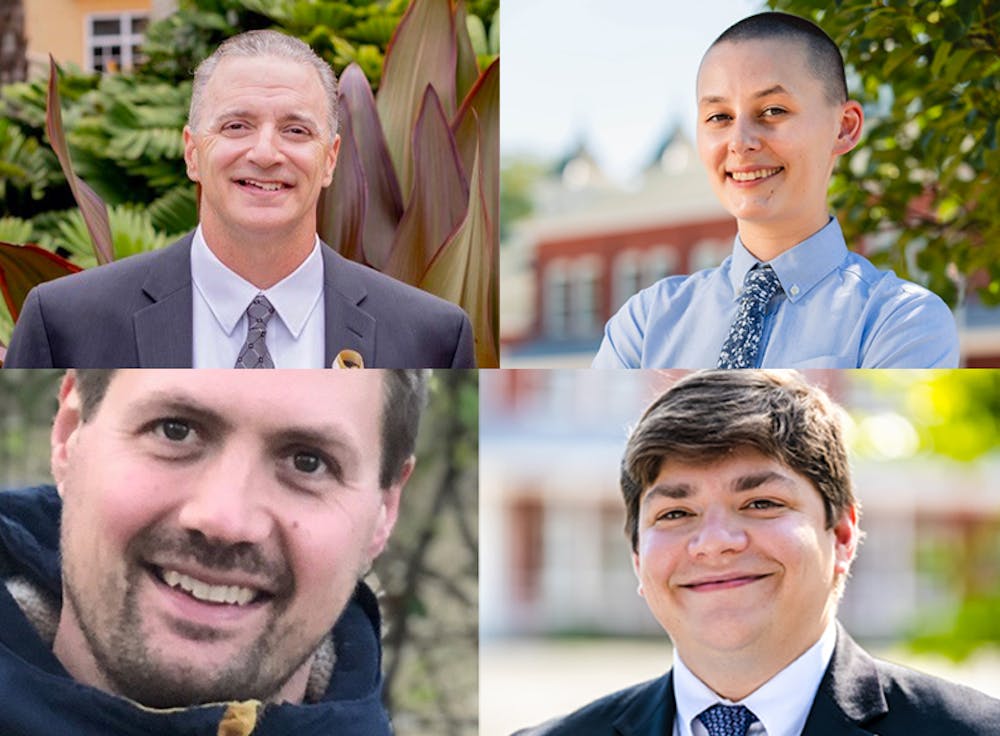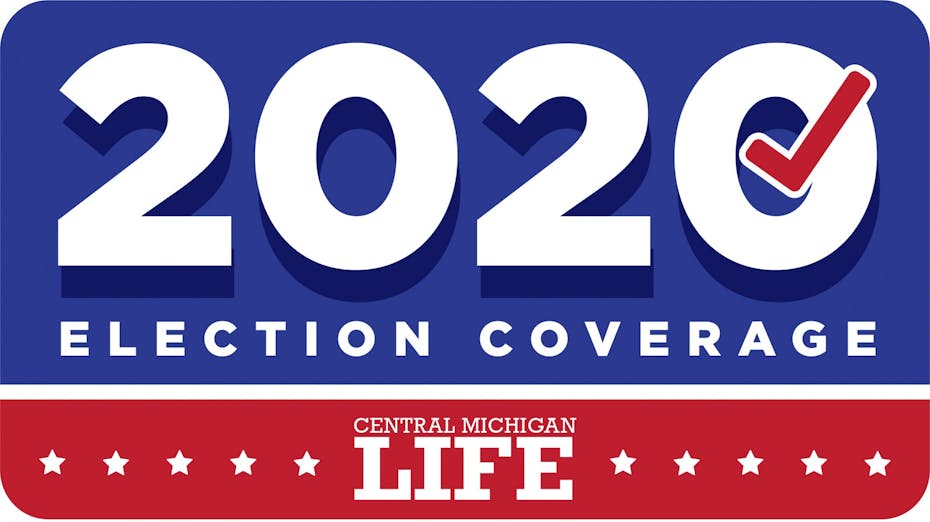Four seek election to Mount Pleasant city commission
Incumbent, three newcomers discuss why they want to serve Mount Pleasant


Four candidates are running to fill two open seats for Mount Pleasant City Commission in the Nov. 3 election.
Mayor Will Joseph is seeking another term but commissioner Kristin LaLonde is stepping down from the commission. Candidates are running this year for two, three-year terms from Jan. 1, 2021 to Dec. 21, 2023.
Residents planning to vote by mail must register to do so by Oct. 19. Those who register to vote within 14 days immediately before an election must appear in person at their city or township clerk's office and provide proof of residency.
Voters can see which of the seven precincts they can vote at using the map located on the city's website.
The candidates this year are:
- Will Joseph: He has served as mayor for the past two years and a city commissioner for almost three years since being elected in 2017. His term concludes on Dec. 31.
- Olivia Cyman: Originally came to Mount Pleasant in 2015 to attend Central Michigan University. Since then, Cyman has "fallen in love" with the city. This is Cyman's first time running for city commission and she currently works at PNC Bank located at 409 N. Mission St.
- Joshua Agardy: Owner of Pleasant City Coffee located at 205 W. Broadway in downtown Mount Pleasant. This is Agardy's first time running for city commission.
- Barry DeLau II: According to the Morning Sun, DeLau described himself as self-employed last year. This is DeLau's third time running for city commission first running in 2018 and then again last year, losing both times.
Central Michigan Life reached out to all four candidates and asked questions about their platforms. CM Life reached out to DeLau on multiple occasions but did not receive a response for this story.
How could the city commission help bring additional affordable housing to the city?
Joseph: Affordable housing is one of the issues that is near to my heart when I witness the struggles of our community. There are several ways I advocated and supported to meet this challenge. Eliminating parking requirements and increasing capacity per square acre of housing in certain zoning districts will decrease costs to developers and allow rent to be lower. Incentivizing development for lower-income housing with tax breaks to provide quality housing for those who otherwise could not afford it. Finally, making middle housing development easier and legal to build will help to fill our housing gaps.
Cyman: This is an issue that affects many people in our city. We need to make housing more accessible to all families and residents to make homeownership more attainable all, increase employment opportunities and expand our local economy. We need to work with local property owners and maintain a positive, collaborative relationship. Additionally, we must restore and protect housing we already have, and when bringing in new business developments, utilizing local contractors. Right now, 62 percent of housing in Mount Pleasant are rental units, and we need to gain a better understanding as a commission of the dynamics between both rentals and owned units in order to set forth changes.
Agardy: As rental property owners, we see the need for more single-family housing rentals in the future. Student housing is prevalent, but housing for young professionals and families not ready to purchase is very hard to come by. Creating a zoning initiative to allow for rental licenses to be acquired to create single-family housing would be a great benefit.
How do you plan on tackling race-related issues that arise in the city?
Joseph: Race-related issues must be tackled head-on. As mayor, I work to raise the voices of those affected by racism and make sure Mount Pleasant is a welcoming and active community for all. Police Chief Paul Lauria meets monthly with the Human Rights Committee and the Mount Pleasant Diversity Group. Chief (Lauria) is working to reform our use of force and citizen complaint policies to be compliant with national and state guidelines with further guidance by the commission and community groups. As a global community in mid-Michigan, we know the work is never done to be inclusive, equitable and open.
Cyman: Not only do I prioritize handling issues that arise with urgency, I believe it is critical to continuously be aware of how each and every decision the city makes will affect groups of people differently. We must be cognizant of discriminatory power structures that perpetuate and uphold systemic inequalities and commit to an approach of racially and socially conscious decision making. We need to lift up voices of marginalized groups - not only when issues arise, but as a fundamental characteristic of our local political system by getting more people involved in the political process.
Agardy: Mount Pleasant needs to see more minority-owned businesses. I would like to see Mount Pleasant create a more welcoming business climate for such opportunities. Equity of ownership should be achievable to all hardworking members of the community. Ensuring choices that are made at the commission level take into consideration every member of our community equally.
What is the biggest thing you think Mount Pleasant needs to change to improve the community? How do you plan to enact that change?
Joseph: One thing I would like to see changed for a better Mount Pleasant is to retain more of our CMU graduates who can start small businesses, engage organizations and create a more diverse economy. I focused efforts on bringing Mount Pleasant up to date on the desires of young professionals and potential new businesses. This includes improving safety and access to non-motorized transportation, increasing employment and internship opportunities within our city government, shaping our zoning for more multi-use to increase efficiency and lower costs, engaging students at every opportunity and marketing our city to potential new businesses.
Cyman: In order to make Mount Pleasant better, we need to make the resources, services, and opportunities of the city more accessible to all residents. Isabella County has one of the highest poverty rates in Michigan at 23.4 percent. In Mount Pleasant, 35 percent of the residents are below the poverty line. The median household income in Mount Pleasant is less than $38,000, yet the median cost of a home here is over $130,000. I think the two most critical solutions to this issue are expanding affordable housing and increasing viable, sustainable employment.
Agardy: The biggest room for improvement is creating more economic opportunities. As we are an economic redevelopment ready city, I will push to bring the commission focus of new development possibilities.
Are there things that you think the city could do better on in regard to COVID-19? If so, how would you plan to fix these things?
Joseph: The city focused efforts on helping small businesses, communicating science-based information and enforcing Governor (Gretchen Whitmer's) executive orders as well as orders by the Central Michigan (District) Health Department. The city is dedicated to keeping our residents safe, businesses open, and remain flexible to meet the challenges that come our way. We continue to communicate with the health department, CMU, Saginaw Chippewa Indian Tribe, Isabella County, Union Township and the State of Michigan to refine our approach and work together to beat COVID-19.
Cyman: As a candidate, I would like to see Mount Pleasant not just get through the COVID-19 pandemic, but come out stronger. As leaders in the community, we need to be educating the public on best practices to prevent the spread of COVID-19, as well as how, when, and where testing is available. I believe the city worked well with the state and county to follow mandates and executive orders effectively. We need to maintain these relationships. Collaboration and trust in the health department, medical experts, local business owners, and community leaders are essential. We need to make sure we are staying up to date on what is happening on campus (with) how many cases there are, what the trends in cases look like, etc., in order to gain control of the spread, and work with them in whatever ways we can.
Agardy: I feel offering the outside seating as well street closures to allow for outside seating without fees for businesses downtown should be extended another year or two.



